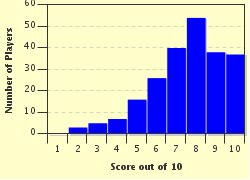Quiz Answer Key and Fun Facts
1. Who was in charge of the Soviet Union during the Cuban Missile Crisis?
2. Which leader oversaw the Great Purges?
3. The Berlin Blockade happened during which leader's reign?
4. Who was around for the construction of the Berlin Wall?
5. Who headed the Soviet Union when the Berlin Wall was demolished?
6. When the Marshall Plan was established, which leader was offered its benefits but declined?
7. Under which Soviet leader was the satellite Sputnik 1 launched?
8. Under whose leadership was the Prague Spring put down?
9. Whose actions ended the Cold War's "détente" period?
10. Who was in office when the 1989 revolutions of Eastern Europe took place?
Source: Author
QuizMakerGod
This quiz was reviewed by FunTrivia editor
bloomsby before going online.
Any errors found in FunTrivia content are routinely corrected through our feedback system.

